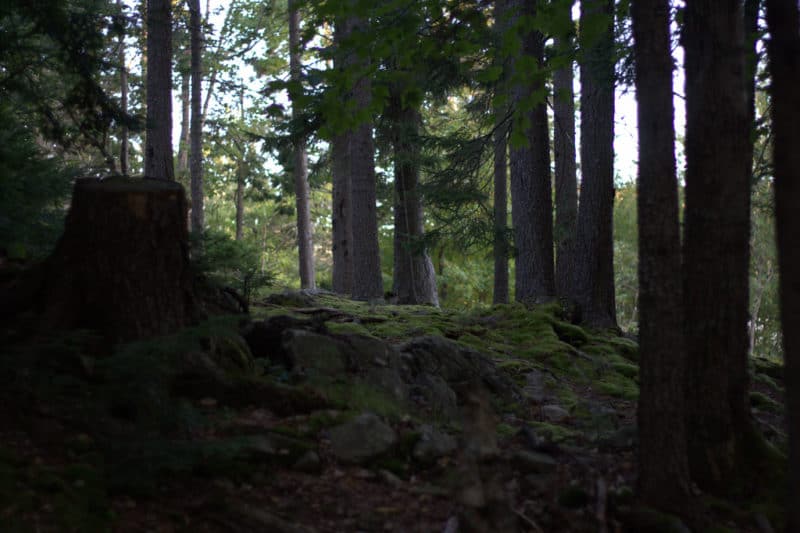Pain clawed my body and blood rushed down my leg. Crazed and mewling I crouched down. My body clenched. The ergot was working. My overalls turned red and blood puddled inside my boots. A cramp seized my belly, bent on expelling any contents. Quickly, I pulled down my pants and reached between my legs. I tried to staunch the flow with my hands, but it oozed through my fingers, staining the snow. Clots, the size of walnuts, broke open when they struck the ice. Now that it was finally happening. I was desperate to stop what I’d begun. Though I tried frantically to hold it in, the baby pushed its way out of me.
A small warm body, weighing no more than a handful of seed corn, dropped into my hand. The warmth faded, leached by cold and death. This life, of nearly three months, was a mystery, some say a miracle, and I wanted to draw each feature on the tablet of my memory. An invisible birthmark.
I was shocked that, even though it was as small as my palm, it was so fully formed. Teeny nails crowned small, stubby fingers and toes. The head was huge, out of proportion to the rest of the body, leaving the tiny ears adrift on the translucent skin. The umbilical cord, through which I had fed nourishment and love, now hung from my womb—my life tethered to her death. Before I could get my knife another contraction expelled the afterbirth. On our farm, stillborn calves were always buried with the afterbirth. I could not bring myself to cut the cord. It was her last connection to me.
It was then, holding her, that all of the grief and fear I had felt for the past few months blew out some spirit in me. I found myself rocking back and forth, crying, “No, no, no. Please don’t let this be true.”
I held her close and whispered, “Please forgive me. But the fire…“ Sobs wracked my body. “We would have been married. We would have been a family.” For thirty years I had wanted a baby and now, by my own hand, she was gone.
My mind filled up with the words I couldn’t say to her. After Sean’s death, in order to keep living I had to expunge him from my mind. I stopped visiting the Joyce’s farm where he labored day and night trying to save enough for us to be wed. I couldn’t hear his name. And I couldn’t have his baby. No reminders. I tried to wash away any trace of him.
Shaking uncontrollably, I thought I might faint. Spent of all emotion save a deep and abiding sadness, I reached for Sean’s bundle. A hint of smoke, the searing scent of the fire that had taken him, escaped. The scene replayed in my mind. I awoke to a room filled with an unnatural light. From the window I could see it was the Joyce’s farm. I could have driven the Model T truck, but it would have taken too long. Better to run through our pasture to theirs. The orange sky intensified as I ran toward their farm. Full-throated flames roared louder even than the screams of animals. Just as I reached it, the barn collapsed with a whoosh. Horses, cows, wagons, and Sean were merely fuel. The sound played in the background of my waking life and nightmares were my company as I slept.
Right here, during the summer, we laid naked, letting the shade obscure and enfold us. Although Roosevelt had tried to stay neutral, the sound of marching boots drew closer day by day. I worried that I would lose him to bullets and bombs, but a kerosene lamp and hay devoured him.
I untied the bit of old sheet that held his possessions. Out spilled his “dress-up” shirt, bone white and starched stiff; a plaid, flannel shirt, tattered and threadbare; two pairs of socks, stained and balled up; and his pipe, bite marks etching the stem. At the bottom there was a picture of him sitting on his mother’s lap, the Irish flag behind them.
I kept the pipe and photograph. Bittersweet reminders. I know too late the impossibility of erasing love.
My fingers, now caked with blood, traced the surface of every object. Slowly, I swaddled our baby in his clothing. I pulled on my overalls, now stiff and red. I put the bundle under my coat, a lost treasure resting between my breasts.
In the ravine that separated our farms, I had chosen an ancient hemlock as Sean’s living grave marker. Now it would hold our baby. The tree well had little snow revealing the huge root, exposed by years of spring run off. Erosion had left a hospitable hollow. The chamber, earthen floored and fibrous roofed, created a small sheltered space. I scratched through the snow and gathered leaves and soft green mosses, to make a nest for her. Only then did I entrust our baby to the tree’s embrace. At the creek’s edge, I found a large rock covered in fossils to place, like the lid of a sarcophagus, over the opening.
My hands embraced the trunk of the towering hemlock, my forehead, feverish and clammy, rested against the furrowed bark, and my lips, the lips that only Sean had known, sent a kiss to the heartwood.
“This is my final gift to you. She is a wee thing.”
The Kiss is a bimonthly series curated by Brian Turner. An anthology of the series, The Kiss: Intimacies from Writers, is now available from W.W. Norton.

